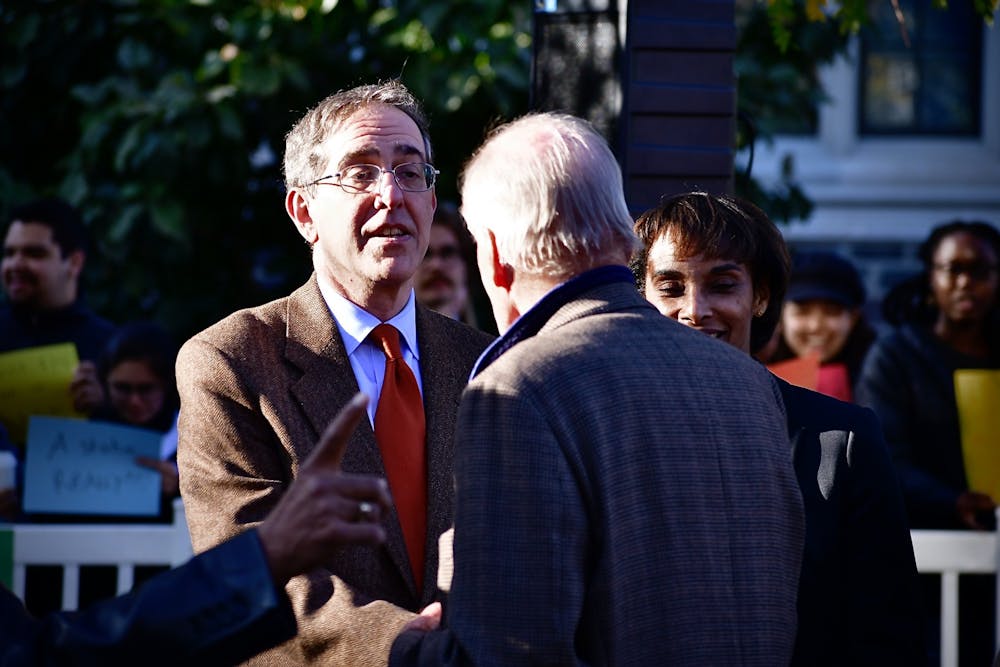“Why should Princeton exist?” That was the question The Atlantic journalist Emma Green asked President Christopher Eisgruber ’83 a few weeks ago. Green framed the question around social mobility: Princeton, after all, doesn’t do much for social mobility compared to the City University of New York (CUNY) system which directly serves the low-income community around them in tangible ways.
Eisgruber made a case that Princeton was an incubator for future leaders — a home for young people with “extraordinary talent.”
Eisgruber’s leadership theory would be a perfectly credible justification for Princeton’s existence, but it runs into a problem: Princeton doesn’t seem to have thought deeply about what it means to be a leader. It’s time to change that — or find a new justification for our existence.
Eisgruber’s argument benefits from being consistent with historical outcomes. After all, Princeton has historically educated the nation’s leaders — the raison d’être of Princeton and similar institutions was to give the nation’s future leaders (historically the white and wealthy, but in Eisgruber’s vision now a more diverse group) the extra education they needed to fill those roles. And there are so many good examples of Princetonians becoming leaders in a variety of ways. James Madison! Alan Turing! Sonia Sotomayor!
But Princeton seems to benefit from some circular logic here. The best students in the country apply to Princeton because of its lofty reputation. Princeton selects the students with the most potential, those least likely to fail. Companies, graduate schools, and other vessels of advancement recruit from Princeton because it has a reputation for being the best, further advantaging the students who’ve made it in. Alumni, unsurprisingly, thrive, and we all pat ourselves on the back for what a great system we’ve created. Princeton could have us play hopscotch for four years and do perfectly well by this metric. Princeton producing leaders is therefore not necessarily a function of the extraordinary educational environment Eisgruber claims it offers to students, but rather the reputational value the admission into this environment brings.
If we can’t rely on the mere existence of extraordinary alumni who show leadership, what proves Princeton is actually an incubator for leadership? Eisgruber characterizes Princeton as an “intense [place] where researchers and students are colliding with other people of talent and passion and imagination, focusing on producing things that matter to our society and our world in a whole variety of unpredictable ways.” Eisgruber is betting that random interactions among smart students under the care of some of the world’s greatest scholars will innately build future leaders.
It’s not that there is no merit to this theory. But imagine you were starting a society from scratch and you went to Christopher Eisgruber and asked him what his plan was to educate the potential leaders of the society.
“Oh, we’ll just put them all together in some Gothic buildings, give them two billion dollars to spend each year, stick Peter Singer and Jhumpa Lahiri there for good measure and watch the incredible things they create,” he could respond. “They can just do normal university coursework in the meantime.”

Such a vague plan would beg the question: how exactly would this be achieved?
And when we ask this question regarding the current Princeton education, certain obstacles come to mind that stand in the way of its effective implementation. Students are so burdened with ordinary coursework that the type of spontaneous creation Eisgruber hopes for is severely constrained. In my experience, student projects often collapse on campus due to a lack of time and interest.
Aside from faded quotes on aging buildings, there is insufficient dialogue and honesty on campus about leadership or what students should be doing to meet their responsibilities as the beneficiaries of Princeton’s immense resources. Some students may become Supreme Court justices like Sonia Sotomayor, but many may reap the advantages of a Princeton degree without ever using it for the purposes Eisgruber hopes for. Who is telling them they should?
The flaws in Eisgruber’s justifications ultimately bring us to question the idea that leaders are built on cloistered campuses, far from the realities of the real world. Is there really another book we can read or a seminar we can take, even with incredible classmates and professors, that can substitute for real-world experience? Almost two years after Zoom taught us that we could be anywhere in the world at any time, we’re back staring at blackboards, secure in our smugness that we’re molding the next generation of leaders.

Plato had a formula to educate his ideal society’s leaders — early education in music and physical training, three years of intense physical training, 10 years of math, five years of philosophy, then 15 years of practical political training. Now, maybe Eisgruber is correct and Plato is wrong. It would not be the first time. Maybe the mere environment of Princeton, the quality of our peers and professors, does more for leadership than a specific academic program ever could.
But if this is the justification, it deserves some serious study. We cannot just rely on the cliché that Princeton produces the nation’s leaders based on a self-serving system. And we would have to make changes to ensure that we’re actually making the most of the opportunity and getting enough practicum to serve society well. Because Green is right, if Princeton is going to segregate a talented few, it has to prove its value every single day.
Rohit Narayanan is a sophomore concentrating in electrical and computer engineering from McLean, Virginia. He can be reached at rohitan@princeton.edu.








